|
|
|
Sort Order |
|
|
|
Items / Page
|
|
|
|
|
|
|
| Srl | Item |
| 1 |
ID:
119045
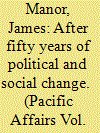

|
|
|
| 2 |
ID:
087859
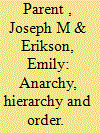

|
|
|
|
|
| Publication |
2009.
|
| Summary/Abstract |
How does order emerge from anarchy? While scholars generally agree that international politics is anarchic, there is much dispute about how anarchy orders relationships. This paper challenges prevailing views by attacking the problem of anarchy from behind. We examine how hierarchy creates order and argue that two mechanisms are responsible. The first is the direct actions of a leviathan; the second is an indirect effect, which counterintuitively results from insurmountable handicaps to central authority, that we call the threat of incompetent intervention. We then examine how these two mechanisms affect order as power decentralizes and highlight how bottom-up and top-down processes intersect. Our arguments are tested in difficult cases: highly developed states, where central authority is strongest, and international politics, where central authority is weakest. The arguments have broad implications for all the paradigms, trust in world politics and organizational change.
|
|
|
|
|
|
|
|
|
|
|
|
|
|
|
|
| 3 |
ID:
177667
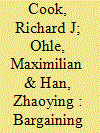

|
|
|
|
|
| Summary/Abstract |
Actors partially relinquish sovereignty in return for physical protection by a more powerful actor, generating a hierarchical relationship of a dominant, which supplies a political order, and subordinate(s), seeking the benefits that the political order can offer. This is the outcome of rationally assessing the respective situation, ultimately forgoing the presupposed paradigm that all actors are acknowledged as equal units in IR. The product of applying this hierarchical rubric to the Korean Peninsula offers a fundamental alternative for understanding how and why the current Korean Peninsula Nuclear Crisis unfolded in the manner that it did, while building upon relevant literature constituting the crux of hierarchy in international relations. What is presented are two political orders running parallel to one another: (1) the USA and the ROK and (2) China and the DPRK. Historically, both orders took fundamentally different tracks, as the USA and the ROK maintained a tight, valued and active social contract, while China and the DPRK periodically drifted into loose, devalued and inactive phases. Additionally, a paradigm has emerged following China’s inclusive behavior post-1978, the USA’s unipolar moment, and Washington’s aggressive signaling and actions, forcing the DPRK to reconsider its dominant’s reliability as a credible security guarantor. Having witnessed these seismic shifts, the DPRK has intensified its development of ‘the ultimate security guarantor’, leading to the contemporary crisis we are facing today.
|
|
|
|
|
|
|
|
|
|
|
|
|
|
|
|
| 4 |
ID:
175172
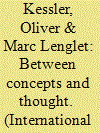

|
|
|
|
|
| Summary/Abstract |
This article advances the argument that the acceleration of practices introduced by digital technologies also impact key concepts of social theory. Digital technologies not only give rise to new concepts, but they also reconfigure our entire socio-political conceptual vocabulary. In particular, this acceleration reorganises the relationship between the spatial and temporal dimensions of political concepts. As a consequence, our spatially defined understanding of authority, hierarchy or relation underestimates the repercussions of shifting temporalities. This article pursues this shift from space to time and outlines how temporal relationality is gradually impacting the representations and images we live by.
|
|
|
|
|
|
|
|
|
|
|
|
|
|
|
|
| 5 |
ID:
150998
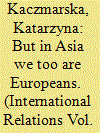

|
|
|
|
|
| Summary/Abstract |
The standard of civilisation served Western states to hierarchically organise international politics and reproduce Western pre-eminence. Russia, depending on the historical period, has been interpreted as either an ardent follower or a major challenger to Western projects, but it has been markedly absent from debates regarding the standard. This article proposes to engage Russia in the standard of civilisation discussion with reference to the standard’s two most considered expositions: the colonial-era ‘original’ and what the literature interprets as the standard’s contemporary revival. In order to do so, I trace Russia’s nineteenth-century colonial practices and analyse Russia’s selected policies towards post-Soviet states in the post–Cold War period. On the basis of these explorations, I argue that Russia’s application of the standard of civilisation goes beyond the mere reproduction of hierarchical arrangements between an imagined centre and peripheries. The practices of the standard of civilisation have been employed to improve Russia’s desired, and imagined, status in international politics – that of a great power equal to the West. From that it follows that the concept of the standard of civilisation should be recognised as ordering relations not only of the strong and the weak but also of those in position of power in international politics.
|
|
|
|
|
|
|
|
|
|
|
|
|
|
|
|
| 6 |
ID:
192303
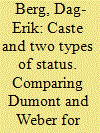

|
|
|
|
|
| Summary/Abstract |
In this article I argue that the concept of status requires more attention in today’s scholarly approach to caste. Caste has become a contested concept which authors define in multiple ways, but the different definitions of status in India’s caste system remain unclear. This article focusses on the two seminal contributions of Louis Dumont and Max Weber. Both have frequently been criticised and dismissed, but this article aims to delineate and compare their different understandings of status. Their contributions have often been judged according to their cultural significance or general concepts of modernity; however, by unpacking their approaches to status, a proper distinction can be made between achieved and attributed status in the study of caste. Thus, revisiting and comparing Dumont’s and Weber’s different concepts of status may create greater clarity when explaining ‘exclusion’ and the evolving caste practices in India and in the diaspora.
|
|
|
|
|
|
|
|
|
|
|
|
|
|
|
|
| 7 |
ID:
188744
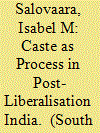

|
|
|
|
|
| Summary/Abstract |
The task of recent scholarship on India’s post-liberalisation period has been, in part, a re-casteing: a deliberate investigation of the ways in which historically embedded hierarchical divisions are continually reworked and thereby reinvigorated. Amid contemporary debates over the forms, sites and effects of caste and caste discrimination, this article identifies a shift in critical scholarship towards understandings of caste as process. Processual readings of caste within market- and merit-based institutions productively reframe caste in India from a ‘relic’ undergoing erosion to an accretion of new layers and logics upon older principles of innate human value.
|
|
|
|
|
|
|
|
|
|
|
|
|
|
|
|
| 8 |
ID:
158941
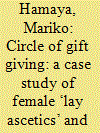

|
|
|
|
|
| Summary/Abstract |
This article investigates everyday practices of begging among female ‘lay ascetics’ in Haridwar, North India. The subject of female asceticism or renunciation in Hinduism has been far less examined than that of male renunciation. Recent feminist-conscious studies have pointed out that female ascetics are generally marginalized within, or completely excluded from, male-dominated ascetic communities, albeit some charismatic female gurus do manage to establish a measure of authority. But gender-based inequality is not the only form of inequality that matters here. This article explores the lives of female ‘lay ascetics’ who are regarded as neither authentic renouncers nor ordinary householders. While male ascetics are prioritized in receiving alms, most female ascetics must struggle to obtain alms through making use of their social networks. Female ascetics cooperate with each other in this for both their mutual advantage and for spiritual reasons. Yet serious competition over alms can and does arise, which can generate moral dilemmas and severe conflict. Through ethnographic descriptions of their gift exchanges, this article will clarify how female ascetics form social networks which are neither completely obligatory nor completely free.
|
|
|
|
|
|
|
|
|
|
|
|
|
|
|
|
| 9 |
ID:
149779
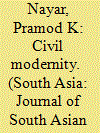

|
|
|
|
|
| Summary/Abstract |
This essay argues that etiquette books produced during the period 1880–1930 sought to contain the increasingly Westernised and cosmopolitan colonial subject by creating a regime of respectability and civility. These books formulated norms of social interaction, imparting advice on rational, hierarchic behaviour and cultural literacy. This discourse of civility was a mode of ameliorating the threat of the hybridised colonial subject by framing his cultural and social interactions within very particular modes of conduct while retaining the hierarchies necessary for imperial dominance.
|
|
|
|
|
|
|
|
|
|
|
|
|
|
|
|
| 10 |
ID:
167180
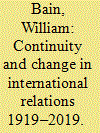

|
|
|
|
|
| Summary/Abstract |
This article reflects on themes of continuity and change over the past century of international relations. In 1919 the victors of the First World War endeavoured to remake international relations by abolishing war and erecting institutional structures that were intended to promote a more just world order. The achievements and failures of this project can be discerned in overlapping patterns of continuity and change that portray a world that is at once old and new. The discourse of change tends to dominate thinking about international relations. Technological innovation, globalisation, and human rights, among other factors, cultivate the progressive ‘one-worldism’ of an interconnected global community of nations and peoples. But, evidence of change notwithstanding, much of contemporary international relations would be intelligible to persons who lived a century ago. International relations is still fundamentally about order and security, power and restraint, and freedom and equality. These patterns provide an important reminder that progress is possible but that international relations involves an open-ended project of continuous renovation and conservation.
|
|
|
|
|
|
|
|
|
|
|
|
|
|
|
|
| 11 |
ID:
194006


|
|
|
|
|
| Summary/Abstract |
Though it is a core function of a sovereign state, governments do not navigate defense policy free from outside influences and constraints. The provision of external security requires armed forces to be adequately equipped but the distribution of material resources - defense-industrial capacity – for such equipment is not even but rather concentrated in the international system. How do alliance politics and defense-industrial policy connect? Our contribution highlights the material resources for military alliance effectiveness and emphasizes a strategic view of the relationship between these material factors and alliance burden-sharing. The sudden surge in demand for materiel resulting from Russia’s invasion of Ukraine revealed the defense-industrial fault lines within the transatlantic alliance. We outline existing dependencies and interdependencies, identify trade-offs and connections between industrial policy and defense spending, and formulate policy recommendations based on our findings. Taking a political economy of security perspective, these recommendations are aimed at a better understanding of how industrial politics and alliance stability are intertwined. They suggest pathways to a new and more stable transatlantic defense-industrial bargain in an era of increased great power conflict.
|
|
|
|
|
|
|
|
|
|
|
|
|
|
|
|
| 12 |
ID:
160510
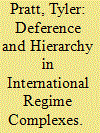

|
|
|
|
|
| Summary/Abstract |
How do states resolve jurisdictional conflicts among international institutions? In many issue areas, global governance is increasingly fragmented among multiple international organizations (IOs). Existing work argues this fragmentation can undermine cooperation as different institutions adopt conflicting rules. However, this perspective overlooks the potential for interinstitutional coordination. I develop a theory of institutional deference: the acceptance of another IO's exercise of authority. By accepting rules crafted in another IO, member states can mitigate rule conflict and facilitate a division of labor within the regime complex. I use an original data set of over 2,000 IO policy documents to describe patterns of deference in the counterterrorism, intellectual property, and election-monitoring regime complexes. Empirical tests support two theoretical claims. First, institutional deference is indeed associated with a division of labor among institutions: IOs that defer to each other are more likely to focus their rule-making efforts on separate subissues. Second, deference is a strategic act that is shaped both by efficiency concerns and power politics. Statistical tests confirm that deference is used to efficiently pool resources among disparate organizations, and that IOs with weaker member states tend to defer to organizations with more powerful members.
|
|
|
|
|
|
|
|
|
|
|
|
|
|
|
|
| 13 |
ID:
176493
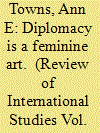

|
|
|
|
|
| Summary/Abstract |
The aim of this article is to examine whether and how diplomacy may be gendered, symbolically and rhetorically, using US representations of diplomacy as a case. Prior scholarship on gender and contemporary diplomacy is sparse but has shown that the symbolic figure of ‘the diplomat’ has come to overlap tightly with ‘man’ and be associated with traits often attributed to masculinity. Inspired by queer international relations methods, relying on the concept of ‘figuration’ and focused on US news media and biographies of diplomats from the past decade, this article uncovers and examines a palette of feminised figurations also at play in US representations of diplomacy, including the diplomat as ‘the “soft” non-fighter’, ‘the relationship builder’, ‘the gossip’, ‘the cookie-pusher’, and ‘the fancy Frenchman’. These feminised figurations alternate between configuring the diplomat as a woman and – more commonly – a (feminised) man. The analysis complicates rather than displaces existing claims, highlighting the importance of attention to slippages and challenges to dominant masculinised subject positions.
|
|
|
|
|
|
|
|
|
|
|
|
|
|
|
|
| 14 |
ID:
195141


|
|
|
|
|
| Summary/Abstract |
The Republic of Korea’s (ROK) Indo-Pacific strategy is widely interpreted as mimicking the language, tone, and agendas of the US Indo-Pacific strategy. Drawing upon existing theoretical work on hierarchy and international relations, this paper challenges simplistic views of the ROK strategy as a pro-US document by presenting a new model of intra-hierarchical messaging to explain how demonstrations of solidarity with a hegemonic order (compliance narratives) can also contain attempts to reassign responsibilities and privileges within this order (distinction narratives). Applying this framework to the ROK strategy reveals how a strong compliance narrative supporting the US hegemonic system exists alongside a distinction narrative articulating a more profitable role for the ROK that deviates from US expectations. Although this strategy has partly elevated Korean status in the US world order, tensions between these narratives may lead to potential negative outcomes for the ROK, such as empty solidarity or reined in leadership. Nevertheless, the article concludes that it may be in US interests to continue this renegotiation of the hegemonic contract.
|
|
|
|
|
|
|
|
|
|
|
|
|
|
|
|
| 15 |
ID:
164976
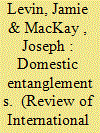

|
|
|
|
|
| Summary/Abstract |
This article revisits the Hobbesian account of the state of nature and the formation of states, attending to Hobbes’s account of the family. Drawing on feminist readings, we find in the Leviathan an account of the family as a natural political community. We contend specifically that a focus on conceptions of family life in the Leviathan, and in works by Hobbes’s early modern peers, points to the role of the family as a site of socialisation in the prelude to early state formation and in the formation of political hierarchies more generally – including, we suggest, the formation of international hierarchies. These accounts have thus far been missing from International Relations theory. Contra conventional IR theoretic readings of the Leviathan, the Hobbesian state of nature contains the seeds of both anarchy and hierarchy, as overlapping social configurations. While anarchy emerges clearly in the famous condition of ‘war of all against all’, hierarchy also exists in Hobbes’s depiction of family life as a naturally occurring proto-state setting. On the basis of this contemporary feminist analysis of a classic text, we consider implications for the emerging ‘new hierarchy studies’ in IR.
|
|
|
|
|
|
|
|
|
|
|
|
|
|
|
|
| 16 |
ID:
110203
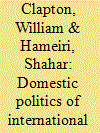

|
|
|
|
|
| Publication |
2012.
|
| Summary/Abstract |
Recent work has identified new hierarchical relationships within international society. However, few scholars have provided a satisfactory account of what informs their formation, reproduction or constitutional effects for international society. We argue that underpinning the emergence of a more hierarchical international society is a new social logic of risk, which constructs illiberal and/or fragile states as potentially dangerous sites of instability and disorder that pose particular security risks for Western states. We proceed to argue that such risk-based hierarchies are transformative of both inter-state and intra-state relations, by stripping equal political agency from 'risky' actors within and without the state. We demonstrate these claims by drawing on examples of international state building in Southeast Asia and the Southwest Pacific.
|
|
|
|
|
|
|
|
|
|
|
|
|
|
|
|
| 17 |
ID:
157729
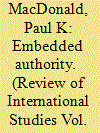

|
|
|
|
|
| Summary/Abstract |
Relations of sovereign inequality permeate international politics, and a growing body of literature grapples with the question of how states establish and sustain hierarchy amidst anarchy. I argue that existing literature on hierarchy, for all its diverse insights, misses what makes hierarchy unique in world politics. Hierarchy is not simply the presence of inequality or stratification among actors, but rather an authority relationship in which a dominant actor exercises some modicum of control over a subordinate one. This authority relationship, moreover, is dramatically different than ones found in domestic hierarchies. It is shaped less by written laws or formal procedures, than by subtle forms of manipulation and the development of informal practices. For this reason, hierarchy cannot simply be reduced the to the dynamics of anarchy, and must be viewed as a relational phenomenon. Ties between actors create positions that permit dominant actors to appropriate and orchestrate the sharing of authority with subordinate intermediaries. This article develops this relational network approach, highlighting how concepts such as access, brokerage, and yoking can illuminate the processes by which authority is enlisted and appropriated in world politics.
|
|
|
|
|
|
|
|
|
|
|
|
|
|
|
|
| 18 |
ID:
132947
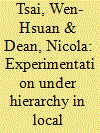

|
|
|
|
|
| Publication |
2014.
|
| Summary/Abstract |
Reforms carried out by the Chinese Communist Party (CCP) have long followed a traditional model of "experimentation under hierarchy." This article will attempt to develop this model further by building a framework to illustrate the influence of both the political dynamics of hierarchical central-local relations and local economic circumstances in the introduction of large-scale political reforms. The initiation and expansion of "experimental points" are only permitted in those select few provinces with both favourable political and economic local conditions, allowing the CCP to minimize risk and make informed decisions regarding possibilities for nationwide reform. This article proposes that the hierarchical interaction of central and local political elites, and in particular provincial secretaries, can explain the extent of reforms, whereas the type of reform is linked to distinct provincial economic conditions and the provincial secretary's interpretation of provincial priorities. Put succinctly, the CCP's model of political reform can be specifically characterized as "experimentation under hierarchy in local conditions." This article presents a detailed discussion of both the political and economic considerations inherent in this concept, and provides examples of reform programmes in Guangdong and Sichuan to illustrate the model in practice.
|
|
|
|
|
|
|
|
|
|
|
|
|
|
|
|
| 19 |
ID:
121727
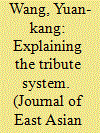

|
|
|
|
|
| Publication |
2013.
|
| Summary/Abstract |
In this article I remedy the popular misconception that the East Asian international system was hierarchical and non-egalitarian in history. I argue that the tribute system is mainly a function of power. Backed by power, Confucian norms and rules became the rules of the game in the system. Power asymmetry gave rise to hierarchy in foreign relations while power symmetry led to diplomatic equality between great powers. East Asia during the tenth to the thirteenth centuries was a multistate system without a regional hegemon. In the Song-Liao international system (960-1125), due to power symmetry, the two great powers conducted their foreign policy on the basis of formal equality. In the Song-Jin international system (1127-1234), the weaker Song China became a Jin vassal state and acknowledged its inferior status in the Jin-derived hierarchy. In studying historical East Asia, Confucian rhetoric needs to be examined against power reality. Only by taking power seriously can we get a better understanding of the East Asian international system.
|
|
|
|
|
|
|
|
|
|
|
|
|
|
|
|
| 20 |
ID:
167245
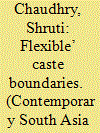

|
|
|
|
|
| Summary/Abstract |
Based on ethnographic fieldwork in a village in the north Indian state of Uttar Pradesh, this article focuses on cross-regional marriage (those that cross caste and linguistic boundaries and entail long-distance migration) as mixed marriage. It queries the ‘acceptance’ of women sought beyond traditional boundaries of caste in a context where caste endogamy is the norm and breaches are otherwise not tolerated. It argues that while the caste of the women is overlooked when the alliance is made, their caste does not cease to be a concern in the caste-bound rural communities into which they marry. A discourse of caste, centred on food transactions, derogatory remarks about skin colour and in the refusal to marry the children of cross-regional couples, serves to mark difference and make claims to status. While there has been a decline in certain exclusionary caste practices in the village, a sense of hierarchy is retained.
|
|
|
|
|
|
|
|
|
|
|
|
|
|
|
|
|
|
|
|
|